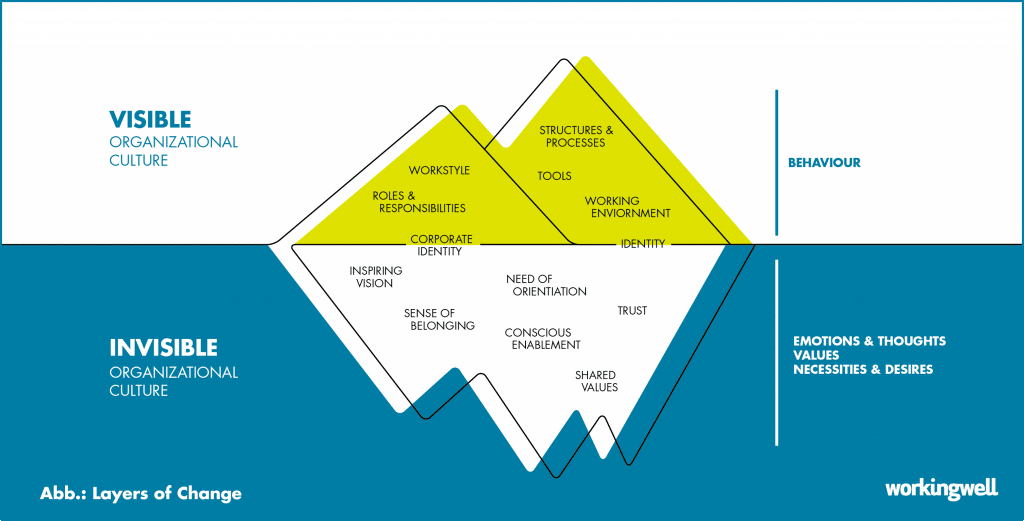Change is a permanent process
If companies today decide to comprehensively change their working environment, professional change management is always of central importance. Because on the way to New Work, it is not just the working environment that is changing. The change always includes a new view of the topics of “leadership,” “collaboration,” “trust” and “communication.
In this sense, changes aimed at New Work should be seen as a permanent process. In addition, change should become part of the corporate vision and reflect the inner attitude of the company and its employees.
Turning people affected by change into participants
The term change management is actually misleading, because change cannot be managed – like a project – in the classic sense. Change is a strategic decision and a long-term commitment. It is made by top management and passed on to the employees. The basic prerequisites are always clear and comprehensible goals and a common attitude, so that everyone supports the change project.
When visualizing change processes, the image of an iceberg can be used. The visible change project basically only takes place on the tip of the iceberg. The entire change process, however, goes much deeper.
In our image, everything that lies under the water symbolizes exactly what really moves people. This is where emotions, concerns and personal attitudes lie. Therefore, this area also offers the great opportunity to generate enthusiasm and acceptance.
The deeper-lying aspects should be addressed early on so that employees support the change. And also understand it and accept it positively. It is particularly important to encourage employees to address their wishes and concerns. This is the only way to turn people affected by change into participants. If this succeeds, employees will embrace the change and become actively and enthusiastically involved in the change process. And that is exactly what New Work is all about.
First comes the mindset – second the tools
New Work change is a matter of attitude. First comes the mindset, second the tools to support you managing the change. The following assumptions will guide everyone who is willing to embrace the systemic way of approaching change through the path of transformation. They sound simple – and they really are!
Take away: 8 points for a successful change management
Always start with the “why”
Without a clear vision of where the company is going there is no chance to engage people. The vision should be embedded in the company strategy and should be referring to the values. Then break this “why” down into a clear communication, into a roadmap with defined quick wins and recognizable milestones. Make sure that the management uses this vision as the compass to lead your people through the transformation.
Assume: everyone is doing his/her very best
This is the first and most important – as well as the most difficult – basic assumption. Only if we remain open and really assume and accept that the person in front of us is doing the best he or she can within the scope of his or her possibilities, we will be able to work in a solution-oriented manner.
Create clarity and meaningfulness
People want to take responsibility and do something meaningful. If they why a change is happening, they are taken by the hand and their role is clear, they definitely want to take responsibility. Furthermore, it is important to define clear roles and to make sure that the involved people are also enabled to take responsibility (time investment and also a very clear mandate).
Heads up: the system knows the answer
Change processes should be supported by a participatory approach involving cross-section representatives of the organization: male, female, others, newbies, longstanding ones and the “keepers”. Because those who make up the system know best what adds value and are also most interested in bringing the solutions to life.
Build the community first – decisions will follow
Take enough time to bring people together, to make them feel comfortable in their environment, to offer them a trusted space where they can ask questions, bring in their concerns but also ideas and engagement. Decisions – mostly the right ones – will follow.
Keep in mind: grass doesn’t grow faster when you pull it
Change processes are long processes. Don’t expect cultural changes to happen overnight. The systemic approach is a long process. But it is more sustainable, because the ones who have been part of this process will also commit themselves to maintaining the implemented measures. Don’t skip any intermediate stage in the process. This looks like a time-saver at first, but sooner or later it is very likely to backfire.
Expand your focus on the positive
If you focus on the negative events that happen in a project or on the people who show zero appetite for it, it seems like there are not enough of them! But when you start switching your focus, suddenly things don’t seem so bad after all. That’s why it’s important to keep celebrating successes in the project groups, no matter how small they seem. Communicate successes, show appreciation to people who have worked on them – this little exercise works wonders – and it’s definitely contagious!
Consider: those who come are the right ones
If you have set up a workshop and out of the invited 20 people only 7 show up- it’s a disappointment at first, isn’t it? But if you think that the 7 people who are there are the ones who bring time, energy and motivation, then you can expect the result to be extremely good in the end. . When it comes on setting up groups for change projects – especially in the beginning: focus on the ones who want to be part of them. The rest will follow.
With these 8 take aways in mind, a New Work change project can be better initiated and supported. As a New Work consultancy we at workingwell, have learned that involving employees from an early stage by sharing the vision and goals is a successful way to increase the level of acceptance and identification with the new world of work. We assist our clients in accompanying their change projects and to develop long-term strategies on how spatial and cultural change can be realized hand in hand.
From: Chiara Polverini, HR People & Culture at workingwell. With her academic educational background and her professional experience as a change facilitator and systemic coach, Chiara combines theory and practice. She leads comprehensive organizational and cultural changes and supports employees and managers in change processes. This article is based on Chiara’s key note speech held at an offsite of the Cash Back Transfer (CBT) division the World Food Programme (WFP) in September 2021. The CBT is WFP’s innovation project. It combines social and behavioural change communication with a monetary incentive to encourage positive spending habits among recipients of cash entitlements.


 Get in touch
Get in touch